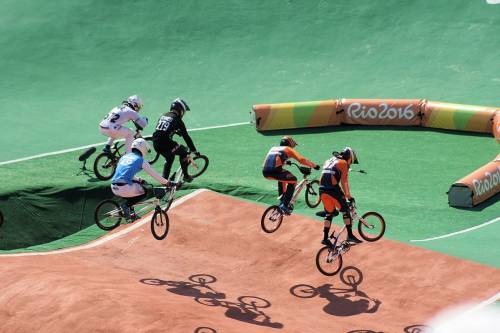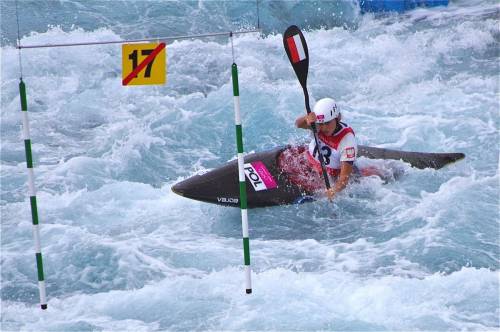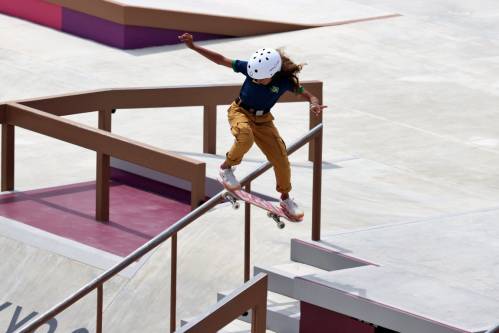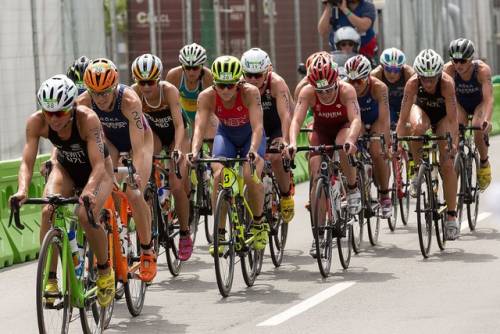Olympic Sports
Welcome back to the penultimate edition of Fixture Calendar’s look at the most exciting sporting events taking place at the Paris Olympics this Summer, where we discuss the history, rules, and who to watch out for.
The article’s focus: the best of the rest. A delve into some of the lesser-known Olympic sports that we think are worth viewing during this year’s event.
Diving was first featured at the Olympics during the St. Louis Games in 1904 and has featured in every Olympics since. Overall, there are eight events to win medals in, four for men and four for women. The events are 3m Springboard, 10m Springboard, and Synchronized forms of those two events. The 3m springboard allows divers to “bounce” to generate extra height before their dive, whilst the 10m platform does not flex. In Paris, the event will take place at the Paris Aquatics Centre, and China are expected to be a dominant force once again. Whilst second in the overall standings, behind the United States, China has been dominant in this sport in recent years, and in Tokyo the nation managed an unbelievable seven golds and five silvers across the eight events. This comes off the back of winning seven gold in Rio, six in London, and seven in Beijing. It would be hard for any nation to trouble China’s grip on this sport in the near future. Great Britain were the only other nation to manage a gold medal in Tokyo, with Tom Daley and Matty Lee winning the Men’s Synchronized 10m Platform Event.
Artistic (Synchronised) Swimming has featured at the Olympic since the 1984 Games in Los Angeles. Paris will see male athletes be allowed to compete in this sport at the Olympic Games for first time in the team event. There are two medals on offer at the Olympic Games, the Team and the Duet. Both events will contain both a “free” routine (approx. 4 minutes long, but otherwise unconstrained) and a “technical” routine (containing 12 mandatory elements). Teams are scored by in both “artistic” and “technical” categories for each routine, and the scores for both routines are combined to determine the overall results. There is no doubting who the most successful nation in recent times are, with Russia winning every gold medal between 2000 and 2020, taking them above the United States in the overall medal table. In Paris 2024, where Russia are once again expected to dominate.
Marathon Swimming, the only outdoor swimming event, where swimmers race over 10 kilometres. It is the latest swimming discipline to be added to the competition programme, when it was introduced at the Beijing 2008 Games. It takes place in open water environments like the sea or rivers, and in Paris will be hosted at Pont Alexandre III through the Seine River. German swimmer Florian Wellbrock won gold in the Men’s event in Tokyo with a time of 1 hour 48 minutes and 33 seconds, showing just how much of a mental and physical test this event is on the athletes. Ana Marcela Cunha won the Women’s Event last time out, beating Rio gold medalist Sharon van Rouwendaal by just 0.9 seconds.
Water Polo is perhaps synonymous with the Olympics, with many people getting their first taste of the unique sport during an Olympic Games. It was first featured in 1900, at the Paris Games. A women’s event was then introduced at the 200 Olympics in Sydney, meaning there are two medal events to be competed. In the men’s event, Hungary have traditionally dominated in this sport, winning nine gold medals, however, Serbia won gold in Rio and Tokyo, but with Croatia winning gold at the 2024 World Aquatics Championships, the men’s event looks like it will be a highly competitive affair. The United States claimed their third gold medal in consecutive Women’s Water Polo events, and they will be hoping to cement themselves as the dominant force in Women’s Water Polo in Paris.
 BMXing has been a feature of the Olympic Games since 2008 in the form of racing, but BMX Freestyle has been added to the Olympic programme from the Tokyo Games. BMX Freestyle takes place within a park containing obstacles including ramps and jumps, riders perform 2-minute routines which are scored by judges in both seeding and finals rounds. Great Britain’s Charlotte Worthington won the inaugural Women’s Freestyle in Tokyo, whilst Logan Martin from Australia won gold in the Men’s event. In BMX Racing, Niek Kimmann from the Netherlands won gold in the Men’s Racing, whilst Beth Shriever won another gold for Britain in the Women’s.
BMXing has been a feature of the Olympic Games since 2008 in the form of racing, but BMX Freestyle has been added to the Olympic programme from the Tokyo Games. BMX Freestyle takes place within a park containing obstacles including ramps and jumps, riders perform 2-minute routines which are scored by judges in both seeding and finals rounds. Great Britain’s Charlotte Worthington won the inaugural Women’s Freestyle in Tokyo, whilst Logan Martin from Australia won gold in the Men’s event. In BMX Racing, Niek Kimmann from the Netherlands won gold in the Men’s Racing, whilst Beth Shriever won another gold for Britain in the Women’s.
Mountain Biking sees Men’s and Women’s Cross Country races take place, and has been a part of the Olympics since the 1996 Games in Atlanta. In Paris, the event will take place at Élancourt Hill, and is expected to be an exciting feature. Great Britain won their maiden gold in the Men’s event, which is often won by French riders, as Tom Pidcock came away with top spot. Switzerland managed to win all three medals in the Women’s Cross Country in Tokyo and it is likely they will challenge for medals again in Paris.
Road Cycling has featured in some form at the Olympics since the beginning of the Modern Olympics in 1896. It now features four events, two each for male and female riders, which are the Road Race, the original Road Cycling discipline at the Olympics, and Time Trial. Pont d'Iéna will play host to all four events. In Tokyo, some huge names competed at the event. In the Men’s Road Race, Wout van Aert claimed silver, behind Richard Carapaz and ahead of third place Tadej Pogačar, whilst Primož Roglič came out with gold in the Time Trial. Dutch rider Annemiek van Vleuten won the Women’s Time Trial and Anna Kiesenhofer from Austria won the Road Race.
Archery first featured at the Olympics in 1900 at the first Paris Olympics, and has been a mainstay in the Olympic programme since the 1972 Summer Olympics. There are both individual and team events for both men and women. In both individual and team events, a seeding round is held, before a head-to-head single-elimination competition determines the final placings. Archery events will be hosted at Les Invalides at the Paris Games this summer. Last time out in Tokyo, South Korea won four out of five golds and are expected to have a strong performance once again in Paris.
The Modern Pentathlon, which has been an Olympic event since 1912, consists of 5 different events that are combined into one competition. Athletes compete in fencing (épée), riding (show jumping), and swimming (200m freestyle). Their performance in these events is converted to create a staggered start for the final portion: a combined cross-country (3.2km) and shooting (pistol) event. The first person to finish this race wins the gold. In Paris, the events will take place at the Palace of Versailles and the North Paris Arena. Great Britain reigned supreme in Tokyo, winning both the Men’s and Women’s gold medals.
Canoe/Kayak features two disciplines at the Olympics: Slalom and Sprint. Canoeing first featured at the Olympics in 1936 at the Berlin Games. At the Paris Games, the events will take place at the National Olympic Nautical Stadium of Île-de-France in Vaires-sur-Marne and will see 16 events take place Canoe or Kayak Sprint, also known as Flatwater, takes place on a lake. Stationary on the water, athletes wait for the starter's gun and then accelerate as quickly as they can to complete the course in the fastest time possible. There are a variety of medals on offer over varying distances and with up to 4 people per boat. This event requires both power and teamwork, and frequently produces close and exciting races.
Canoe/Kayak Slalom is contested on a white-water course. Competitors have to pass through a number of gates on the route, being penalised if they touch them. A few of the gates are “upstream gates” through which the paddler must go against the current. This sport requires great levels of fitness, strength and technique, as well as poise in the boat to flex under the gates, and awareness of the water and its effect on the boat. Whilst both canoes and kayaks are used for this event, there is only ever one athlete per boat. Over the 16 overall canoeing and kayaking events, Hungary and New Zealand came out on top in Tokyo, with both winning three gold medals.
Rowing has been a mainstay at the Olympic Games since the second Olympics in 1900 at the first Paris Games. Only men were allowed to compete in rowing events until the 1976 Montreal Games. Each nation is allowed one boat per event. Both rowing disciplines (scull and sweep) will feature in Paris. Sculling sees rowers control a pair of oars, whilst with sweeping, rowers control only one oar. Sculling events will be single, double, quad, and lightweight doubles, whilst the sweeping events will be: coxless pairs, coxless fours and a coxed eight. The United States lead East Germany and Great Britain as the most successful rowing nation at the Olympics, but neither the Brits or the Americans managed a gold medal at the Tokyo Games, with New Zealand and Australia performing extremely well across all of the events.
Rugby 7s has featured at the Olympics since the Rio 2016 Olympics, which makes it one of the newer additions to the Games featured in this article. Games consist of two 7-minute halves, with 7 players aside making it exceptionally fast-paced, and just as high-scoring as traditional rugby union. Rugby 7s in Paris will take place at the Stade de France and will feature 12 teams in each of the men’s and women’s tournaments. In the men’s tournament, Fiji defended their 2016 title in Rio by winning gold in Tokyo, but with so many elite teams competing at the Games, it is hard to call who will be successful this year, but it is expected Fiji and New Zealand will be amongst the favourites. In the women’s tournament, New Zealand defeated France to claim the gold medal in Tokyo and will want to defend their title in Paris.
Shooting has featured at every modern Olympic Games, and in Paris this summer there will be 15 overall events for competitors to win medals in and will take place at the National Shooting Center in Châteauroux. Air Rifle and Air Pistol events are target-based events, whilst the shotgun event uses “clay pigeons”. The United States are the most successful nation across all of the shooting disciplines, accumulating an impressive 57 golds and 116 medals overall, but China were the more successful nation at the Tokyo Games, winning four golds and 11 overall medals across the 15 events. It is expected that the US and China will compete at the top again this summer in Paris.
 Skateboarding made its Olympics debut in Tokyo last night and was seen as a big success. There will be four events overall at Paris, which will take place at the Place de la Concorde, which are Street and Park for both men’s and women’s events. Street sees skaters compete on different obstacles which mimic what would be found on a street, such as rails, ledges, banks, and gaps; whilst park sees skaters tackle ramps and bowls. Japan reigned supreme in Toyko, winning three out of four gold medals, whilst the US did not perform as well as everybody expected them to, only claiming two bronze medals. The Brazilian athletes also had a successful game, winning three silver medals. The US, Japan, and Brazil are likely to compete for medals again.
Skateboarding made its Olympics debut in Tokyo last night and was seen as a big success. There will be four events overall at Paris, which will take place at the Place de la Concorde, which are Street and Park for both men’s and women’s events. Street sees skaters compete on different obstacles which mimic what would be found on a street, such as rails, ledges, banks, and gaps; whilst park sees skaters tackle ramps and bowls. Japan reigned supreme in Toyko, winning three out of four gold medals, whilst the US did not perform as well as everybody expected them to, only claiming two bronze medals. The Brazilian athletes also had a successful game, winning three silver medals. The US, Japan, and Brazil are likely to compete for medals again.
Climbing was another sport which made its debut in Tokyo which featured two climbing events, but after criticism from the climbing community, this has been increased to four events, two for both men and women, which are Combined and Speed. Climbing will take place at the Le Bourget Sport Climbing Venue in Saint-Denis. Slovenian climber, Janja Garnbret won gold in the Women’s Combined in Tokyo, whilst Alberto Ginés López won the Men’s Combined event. With such a new Olympic sport, it is hard to determine who will come out on top this summer, so make sure you check it out.
Surfing was yet another sport which debuted at Tokyo 2020. There will be two events overall, a men’s and women’s Shortboard event, and will take place at Teahupo'o reef pass, Tahiti, French Polynesia, which breaks the record for the greatest distance between host city and medal competition. 48 surfers will compete over the two events. Ítalo Ferreira claimed gold for Brazil in Tokyo in the Men’s Shortboard, whilst the Women’s Shortboard was won by Carissa Moore from the US.
Triathlon has been a very popular event at the Summer Olympics after its debut at the Sydney Games in 2000, and as of the Tokyo Olympics, there are three events: a Men’s and Women’s Individual Race, and a Mixed Relay Race. The individual events see a 1.5 km (0.93 mi) swim, 40 km (25 mi) cycle, and a 10 km (6.2 mi) run. The inaugural Mixed Relay was won by Great Britain, with the team featuring Jonathan Brownlee, making him the most decorated Olympic Triathlete.
Weightlifting sees 10 events take place at the Paris 2024 Olympics at the Paris Expo Porte de Versailles, split evenly across men’s and women’s weight classes. Olympic weightlifting occurs in two rounds: the “snatch” (one lift with a wide grip) followed by the “clean and jerk” (two-part lift, with a narrow grip). Athletes get 3 attempts in each round, and their heaviest successful lift in each round counts to determine the medals and overall positions. China dominated at the Tokyo 2020 Games, winning 7 gold medals across 14 events.
Finally, Breaking, or breakdancing, will be making its debut in the Olympics in Paris this summer, where there will be two medal events, one for men and one for women. Breaking is a style of street dance which mainly consists of four different movements: toprock, downrock, power moves, and freezes, and is often set to hip-hop music. The sport featured in the 2018 Summer Youth Olympics, and the B-Boys’ event was won by Russian dancer ‘Bumblebee’ and the B-Girls’ was won by Japanese dance ‘Ram’. It will be exciting to see what this event can offer during the Paris Olympics. Make sure to check it out.
As you can see, there are different sports to match everyone’s tastes at the Paris Olympics this year, so make sure you check out as much of the action you can.
This year’s Summer Olympics will take place from 26 July to 11 August in Paris, France. You can easily keep up-to-date and stay informed on every sports event happening at Paris 2024 by creating a Fixture Calendar account or downloading our App.
Why not also check out our This Week in Sport blog, for a rundown or the top sporting events happening each week or get a useful overview of the 15 most exciting events taking place each month with our Fixture Calendar newsletter here.
Harry Stephens, May 2024
Photos by Breno Barros, Jonas de Carvalho, David Merrett, Diego Baravelli